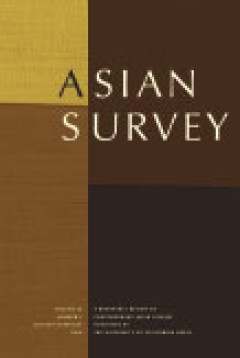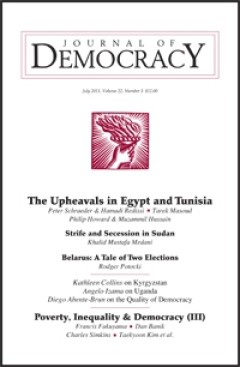Filter by

Family Rule as the Highest Stage of Communism
This article contends that North Korean familism forms part of a broader trend toward family rule in post-socialist countries. Rather than being an outcast, North Korea has become the norm. The notion of “Red Family” as an ideal type is introduced by demonstrating that the selectorate of socialist societies is gradually transforming into a ruling caste. The adoption of the “Red Family” as a mod…
- Edition
- Vol. 51, No. 5, Sept/Oct 2011, pp. 812-843
- ISBN/ISSN
- 00044687
- Collation
- -
- Series Title
- Asian Survey
- Call Number
- -

Social Networks and Ideological Orientation of South Korean NGOs Involved in …
This paper examines the configuration of non-governmental organization (NGO) networks based on their ideological position. By utilizing social network analysis, this study observes the inter-organizational networks of the South Korean unification NGOs, and further examines the reflections of the ideological splits in online space and offline realities.
- Edition
- Vol. 51, No. 5, Sept/Oct 2011, pp. 844-875
- ISBN/ISSN
- 00044687
- Collation
- -
- Series Title
- Asian Survey
- Call Number
- -

A Comparative Study of the Automobile Industry in Japan and Korea
This study utilized sociological perspectives to explain the relationships between institutional arrangements (government’s role, social dimensions of indigenous business organizations, and consumption culture) and non-tariff trade barriers embedded in Japan and Korea. A comparative study of institutional arrangements and the automobile industry reveals that there have been visible and invisibl…
- Edition
- Vol. 51, No. 5, Sept/Oct 2011, pp. 876-898
- ISBN/ISSN
- 00044687
- Collation
- -
- Series Title
- Asian Survey
- Call Number
- -

How Do Campaign Events Affect Regionalism during South Korean Presidential Ca…
This study examines how campaign events influence regional voters’ candidate preferences during South Korean presidential campaigns. Results show that regional voters become more aware of regionalism through campaign events, and, thus, their voting intention becomes more homogeneous within the regions toward the end of the campaign.
- Edition
- Vol. 51, No. 5, Sept/Oct 2011,pp. 899-925
- ISBN/ISSN
- 00044687
- Collation
- -
- Series Title
- Asian Survey
- Call Number
- -

Chiang Mai Initiative Multilateralization
In 2010, the Chiang Mai Initiative Multilateralization agreement established a new Asian financial arrangement to help address potential currency or liquidity crises. This article analyzes the origins and basic features of the new arrangement, which reflect both progress and the continuing political challenges of building regional institutions in Asia.
- Edition
- Vol. 51, No. 5, Sept/Oct 2011, pp. 926-952
- ISBN/ISSN
- 00044687
- Collation
- -
- Series Title
- Asian Survey
- Call Number
- -

The Changing Role of Dialogue in the International Relations of Southeast Asia
ASEAN’s dialogue mechanism has been evolving from consensus-seeking to strategic means, to use the Habermas distinction. This consensus norm was maintained during the Cold War because of rapport among ASEAN leaders and the presence of an external threat. However, ASEAN expansion to 10 countries, the emergence of non-traditional threats to security, and democratization have weakened this norm.
- Edition
- Vol. 51, No. 5, Sept/Octo 2011, pp. 953-970
- ISBN/ISSN
- 00044687
- Collation
- -
- Series Title
- Asian Survey
- Call Number
- -

The Political Rise of the Prosperous Justice Party in Post-Authoritarian Indo…
This article explains distinctive patterns of Islamist mobilization in Indonesia by focusing on the Prosperous Justice Party (PKS). It argues that the relatively solid party-mass relations and broad spatial penetration of PKS are conditioned by its organizational ability to deliver welfare services to strategically targeted constituencies to help construct a community base.
- Edition
- Vol. 51, No. 5, Sept/Oct, pp. 971-992
- ISBN/ISSN
- 00044687
- Collation
- -
- Series Title
- Asian Survey
- Call Number
- -

Hong Kong's Transformation into a Service Hub
Following the return of Hong Kong to Chinese jurisdiction in 1997, there has been concern about the potential marginalization of Hong Kong within China's development. We argue that far from being marginalized, Hong Kong together with the Pearl River Delta is becoming the most dynamic region within China.
- Edition
- Vol. 51, No. 4, July/August 2011, pp. 584-609
- ISBN/ISSN
- 00044687
- Collation
- -
- Series Title
- Asian Survey
- Call Number
- -

Hong Kong-Mainland Innovations in Environmental Protection since 1980
Cross-boundary collaboration in environmental protection between Hong Kong and mainland China from the mid-1980s to the transfer of sovereignty in 1997, and during the post-reunification years, is examined. Emphasis is put on the respective roles of governments, the private sector, and non-governmental organization initiatives focused on air quality management, a key to public health.
- Edition
- Vol. 51, No. 4, July/August 2011, pp. 610-632
- ISBN/ISSN
- 00044687
- Collation
- -
- Series Title
- Asian Survey
- Call Number
- -

The Role of Hong Kong in Mainland China's Modernization in Manufacturing
- Edition
- Vol. 51, No. 4, July/August 2011, pp. 633-658
- ISBN/ISSN
- 00044687
- Collation
- -
- Series Title
- Asian Survey
- Call Number
- -
- Edition
- Vol. 51, No. 4, July/August 2011, pp. 633-658
- ISBN/ISSN
- 00044687
- Collation
- -
- Series Title
- Asian Survey
- Call Number
- -

Hong Kong's Role in Mainland China's Logistics Industry
The importance of Hong Kong's role as fnancier, coach, and physical gateway in the development of container ports and highways in China is diminishing. However, the development of the global supply chain transcends physical boundaries: Hong Kong adapts continuously, and is now taking on bridging and differentiating roles in third-party logistics services.
- Edition
- Vol. 51, No. 4, July/August 2011, pp. 659-682
- ISBN/ISSN
- 00044687
- Collation
- -
- Series Title
- Asian Survey
- Call Number
- -

Value Changes and Legitimacy Crisis in Post-industrial Hong Kong
Social, political, and economic changes in post-industrial Hong Kong brought a less instrumental view of democracy, more skepticism against the neoliberal regime, and more support for post-materialist values. The changing values make the old legitimacy formula obsolete, creating a legitimacy crisis for the undemocratic, business-dominated, and low-interventionist government.
- Edition
- Vol. 51, No. 4, July/August 2011,pp. 683-712
- ISBN/ISSN
- 00044687
- Collation
- -
- Series Title
- Asian Survey
- Call Number
- -

Who's Influencing Whom? Exploring the Influence of Hong Kong on Politics and …
This paper explores how Hong Kong has influenced Chinese politics and governance in the constitutional, political, ideational, and intergovernmental dimensions since 1997. Despite the growing political and economic impact of the Mainland on the Hong Kong Special Administrative Region, the latter has continued to influence the Mainland, especially southern China.
- Edition
- Vol. 51, No. 4, July/August 2011,pp. 713-738
- ISBN/ISSN
- 00044687
- Collation
- -
- Series Title
- Asian Survey
- Call Number
- -

Hong Kong's Contribution to Mainland China's Property Sector
Hong Kong property developers helped Shanghai become a "global city," revitalizing the city core, hosting multinational corporations, and attracting global talent. They transformed the property sector's standards, urban life, and government revenues. Ironically, Shanghai's challenge to Hong Kong is derived from innovations by the same developers who created Hong Kong's remarkable property market.
- Edition
- Vol. 51, No. 4, July/August 2011, pp. 739-768
- ISBN/ISSN
- 00044687
- Collation
- -
- Series Title
- Asian Survey
- Call Number
- -

The Influence of Hong Kong's Policing on China
Police cooperation includes joint anti-crime campaigns, intelligence sharing, evidence collection, as well as mutual exchanges and training. Mainland police have been impressed by the Hong Kong police's practices of operating in accordance with the Police Order, their use of handbooks, the rotation of offcers, and the services of psychological counseling. Knowledge transfer in policing has take…
- Edition
- Vol. 51, No. 4, July/August 2011, pp. 770-784
- ISBN/ISSN
- 00044687
- Collation
- -
- Series Title
- Asian Survey
- Call Number
- -

Rotating Leadership and Collaborative Innovation : Recombination Processes in…
Using a multiple-case, inductive study of eight technology collaborations between ten organizations in the global computing and communications industries between 2001 and 2006 this paper examines why some interorganizational relationships produce technological innovations while others do not. Comparisons of more and less innovative collaborations show that high-performing collaborative innovati…
- Edition
- Vol. 56 no. 2, June 2011,pp. 159-201
- ISBN/ISSN
- 00018392
- Collation
- -
- Series Title
- Administrative Science Quarterly
- Call Number
- -

Executive Personality, Capability Cues, and Risk Taking : How Narcissistic CE…
We adopt an interactionist logic to study the determinants of risk taking by chief executive officers (CEOs). We introduce the concept of “capability cues”—contextual signals that decision makers might reasonably interpret as indicators of their current level of overall ability—arguing that positive cues will induce boldness, while negative cues will induce timidity. Then, drawing from prior th…
- Edition
- Vol. 56 no. 2, June 2011,pp. 202-237
- ISBN/ISSN
- 00018392
- Collation
- -
- Series Title
- Administrative Science Quarterly
- Call Number
- -

How Product Order Affects Market Identity : Repertoire Ordering in the U.S. O…
In this study, we view market identities as interfaces between organizations and their external audiences and examine how the perceived market appeal of organizations can be influenced by the order in which the products or product features that determine their market identities are offered. We theorize that when audiences have different product preferences, organizations may increase their perc…
- Edition
- Vol. 56 no. 2, June 2011,pp. 238-256
- ISBN/ISSN
- 00018392
- Collation
- -
- Series Title
- Administrative Science Quarterly
- Call Number
- -

Set up for a Fall : The Insidious Effects of Flattery and Opinion Conformity …
This study considers the potentially negative consequences for corporate leaders of being subjected to high levels of ingratiation in the form of flattery and opinion conformity from other managers and board members. Chief executive officers (CEOs) who have acquired positions of relatively high social status in the corporate elite tend to be attractive targets of flattery and opinion conformity…
- Edition
- Vol. 56 no. 2, June 2011,pp. 257-302
- ISBN/ISSN
- 00018392
- Collation
- -
- Series Title
- Administrative Science Quarterly
- Call Number
- -

The Global Context
Although the Arab revolts have a long way to go before they can be counted as gains for democracy, they do underline what is perhaps democracy’s greatest source of strength worldwide--its superior legitimacy.
- Edition
- Volume 22, Number 4, October 2011,pp. 5-12
- ISBN/ISSN
- 10455736
- Collation
- -
- Series Title
- Journal of Democracy
- Call Number
- -
 Computer Science, Information & General Works
Computer Science, Information & General Works  Philosophy & Psychology
Philosophy & Psychology  Religion
Religion  Social Sciences
Social Sciences  Language
Language  Pure Science
Pure Science  Applied Sciences
Applied Sciences  Art & Recreation
Art & Recreation  Literature
Literature  History & Geography
History & Geography